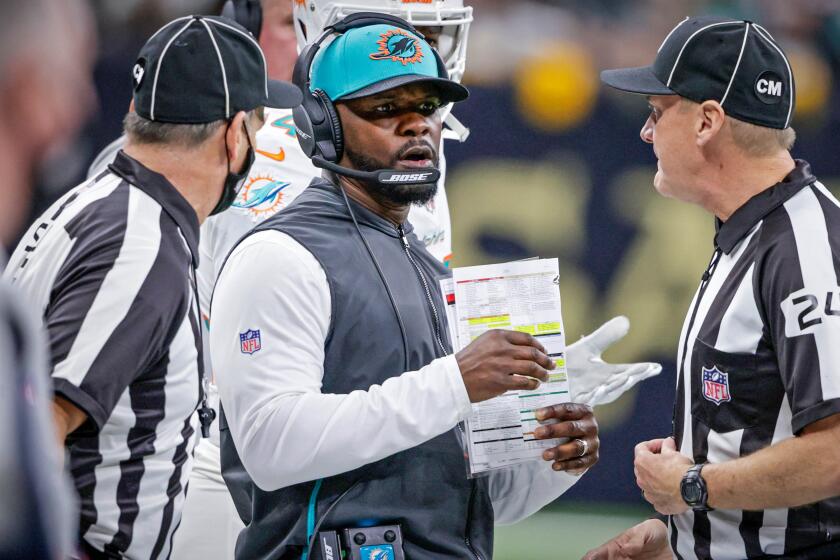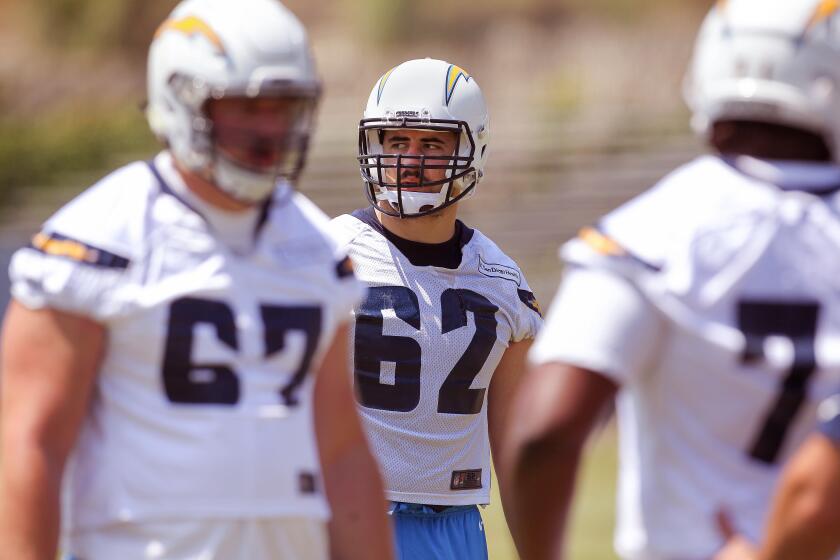What the Brian Flores lawsuit has to do with my decision to let my son play football
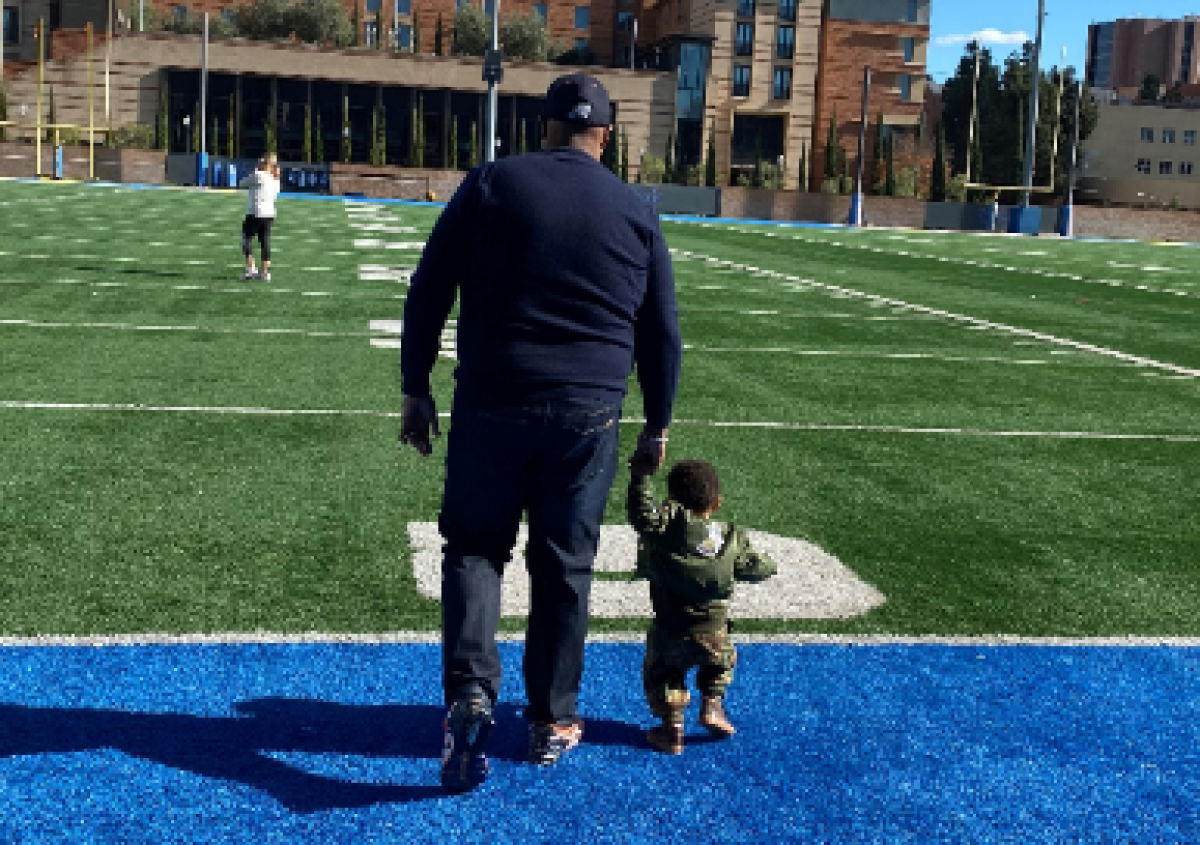
- Share via
“I firmly believe that any man’s finest hour, the greatest fulfillment of all that he holds dear, is that moment when he has worked his heart out in a good cause and lies exhausted on the field of battle — victorious.”
“Yes, I think your son could get a lot out of playing football, but you should know the greatest pain he will ever experience in his life — not only physical but mental — will be from playing this game.”
The first quotation comes from football’s most legendary coach, Vince Lombardi, words that every player, from Pop Warner to the NFL, has likely heard at some point in their life. The latter quote, not known to any of you, comes from one of my teammates at Cal State Fullerton, AJ Jenkins, the 228th overall pick in the 1989 NFL draft by the Pittsburgh Steelers.
They are no less poignant.
For a time after he finished his playing career, or rather after injuries finished his playing career prematurely, AJ ran a youth football camp. A single mother approached him at one of those camps and expressed a wish that her son learn the game of football to “toughen him up.” AJ agreed that the game could accomplish that, but that it could also break him. As the man said, his greatest pain would come from playing football — if he played long enough.
As a new father of a 17-month-old son, I’ve been asked if I will let my son play the game. The fear of concussions and CTE [chronic traumatic encephalopathy] abound in the public’s mind. Even the best players who have lengthy careers wind up with broken bones, arthritic knees and live in constant pain. But Joe Public doesn’t understand what Lombardi did. What a man feels from giving all he has to the game can’t be replicated. It provides the ultimate joy and immeasurable life lessons, and fosters a sense of purpose that will lead a man to great efforts the rest of his life. Frankly, I have disdain for those that ask me, with that smirk of judgment on their faces, if I will let my son play. Yes, I will let my son play, as I don’t want him to ever find his place with those “cold and timid souls that know neither victory nor defeat.”
True, I never made The 49. I was a good but lazy high school player, a better junior college player and a pretty good starting offensive lineman at Cal State Fullerton. I played against LSU when they were ranked fifth in the nation, Florida when they had Emmitt Smith and West Virginia the year they played Notre Dame for the national title. I still view myself first and foremost as a football player. I cannot, and will not, separate that from my being; even at 54.
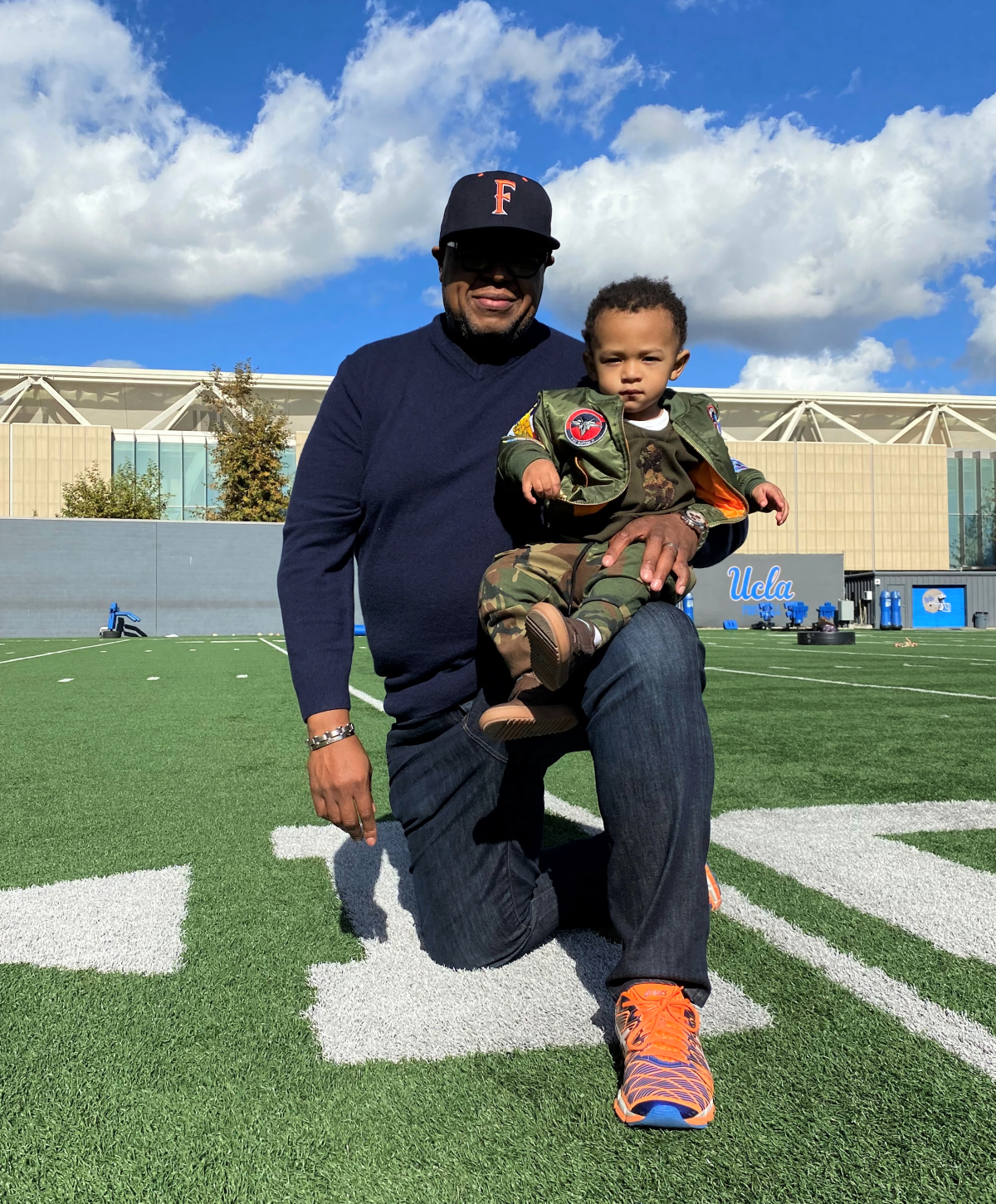
Every time I look down my arm to my left hand and see my permanently disfigured pinkie finger that goes in three disparate directions, which I cannot bend or move at the second joint, I see evidence of what I was willing to sacrifice. Years ago I saw a hand specialist for another issue, and he pointed at my finger and he said; “I can fix that for you.” “No thank you, every offensive lineman has one of these,” I replied. Proudly. I sat with former All-Pro defensive back Josh Norman one day comparing who had the more disfigured fingers. I won, or lost, depending on your perspective.
I will do my best to teach my son, Townsend, all the things I think he needs to be successful in life. But, no matter what Townsend will learn from me, my wife Ashleigh, or at the fine educational institutions of Los Angeles and beyond, if he chooses to play, the game may well teach him more. None of us can duplicate the challenges and that pain he will experience (nor do we want to), which will teach him more about himself than anything else possible.
::
Certainly, Brian Flores found similar purpose during his journey from Brownsville, Brooklyn to head football coach in the NFL. He accomplished this against all odds, one of the few Black men to ever achieve the position. Flores’ lawsuit filed last week gives us a history lesson on just how incredible his achievement is.
The litigator and trial lawyer in me looks at the 58 pages of allegations contained in Flores’ lawsuit and reaches two undeniable conclusions: 1) the NFL has a long history of discriminatory hiring practices that have prevented qualified Black candidates from obtaining head coaching positions; and 2) Flores’ lawsuit has little chance of success. Flores and his lawyers made the strategic decision to bring a class-action lawsuit, undoubtedly, to bring awareness to the pervasive problem of discrimination in the NFL’s hiring practices.
They have to not only raise their voices but take action, whether that’s a summit like the one held in support of Muhammad Ali in 1967 or a flat-out work stoppage.
The complaint filed in Flores’ action does a thorough job of detailing the systemic problem that has led to the dearth of Black head coaches. There are many facts stated in the complaint, the most damning of which is that hardly any black head coaches get a second chance. Since 1963 only 11 coaches of color have been rehired after having held a head coach position. Contrast that with the 57 white coaches who have received a second chance, among them Bill Belichick, Pete Carroll and Andy Reid. Can anyone imagine what the league would look like if those three coaches had not received a second opportunity? What might the league look like if Black head coaches had received that same opportunity?
Actually, we do know what happens when a Black man is given a second chance in the NFL. Tony Dungy won the Super Bowl with Indianapolis after his stint building Tampa Bay into a powerhouse that Jon Gruden would coach to a Super Bowl win, with the roster Dungy had built. The prevailing thought is that Flores committed an act of career self-immolation by filing his lawsuit. But perhaps, and I pray it be so, Flores will not be cast into the abyss. George Floyd’s death started a meaningful conversation about race and discrimination that our country has needed, but avoided, for two centuries. So much so that during the Black Lives Matter protests of 2020, NFL commissioner Roger Goodell tacitly admitted the NFL’s treatment of Colin Kaepernick was abhorrent. In the wake of Flores’ lawsuit, Goodell called the absence of Black head coaches “unacceptable.” There are grounds for optimism that the league will address Flores’ issues, and maybe even give Flores a richly deserved second chance. With all nine coaching vacancies now apparently filled, however, it does not appear Flores’ next opportunity will come this year.
Fifty-seven white coaches have received a second chance, among them Bill Belichick, Pete Carroll and Andy Reid. Can anyone imagine what the league would look like if those three coaches had not received a second opportunity?
There is no doubt Flores is right — his opportunities for a head coaching position in the NFL are limited by the color of his skin. Hard stop. However, as a lawyer, I also know that there are no laws that will mandate the pervasive reform needed to address the allegations in Flores’ complaint.
Under Rule 23 of the Federal Rules of Civil Procedure, Flores will need to establish some procedural elements to proceed in his case. A class-action lawsuit can only be brought where there are numerous similar or common claims that require adjudication at once. There is no precise number of individuals who must be affected to certify a case as a class action, but the lowest number of claims believed necessary for a class action is 40 plaintiffs.
Seventy percent of the NFL’s players are Black, yet the league has only 2 Black head coaches. A lawsuits asks why.
Flores’ complaint seeks to certify a class of individuals of “all Black head coach, offensive and defensive coordinators and quarterback coaches, as well as general managers and Black candidates for those positions” who have been affected by the league’s discriminatory hiring practices. In most class-action lawsuits, the numerosity requirement is presumed. But in Flores’ case can we presume that there are even 40 Black candidates who have been passed over for head coaching opportunities within the statute of limitations? Flores’ expertly drafted complaint itself makes the point: In Paragraph 5 he lists all of the Black coaches and general managers currently in the league. Combined, the total number of these individuals is 33. This shows that Flores may have difficulty even establishing what is typically the easiest element of his case to prove.
Given the procedural hurdles Flores faces, it is highly unlikely a jury will ever hear and decide his claims. Flores and his counsel likely know this and are seeking to expose the NFL’s worst dirty laundry through text messages from one of its sacred cows, Belichick. The most explosive allegation is that Flores was incentivized to lose games, and later punished for not doing so, with the hope that Miami could gain the No. 1 pick in the 2019 draft.
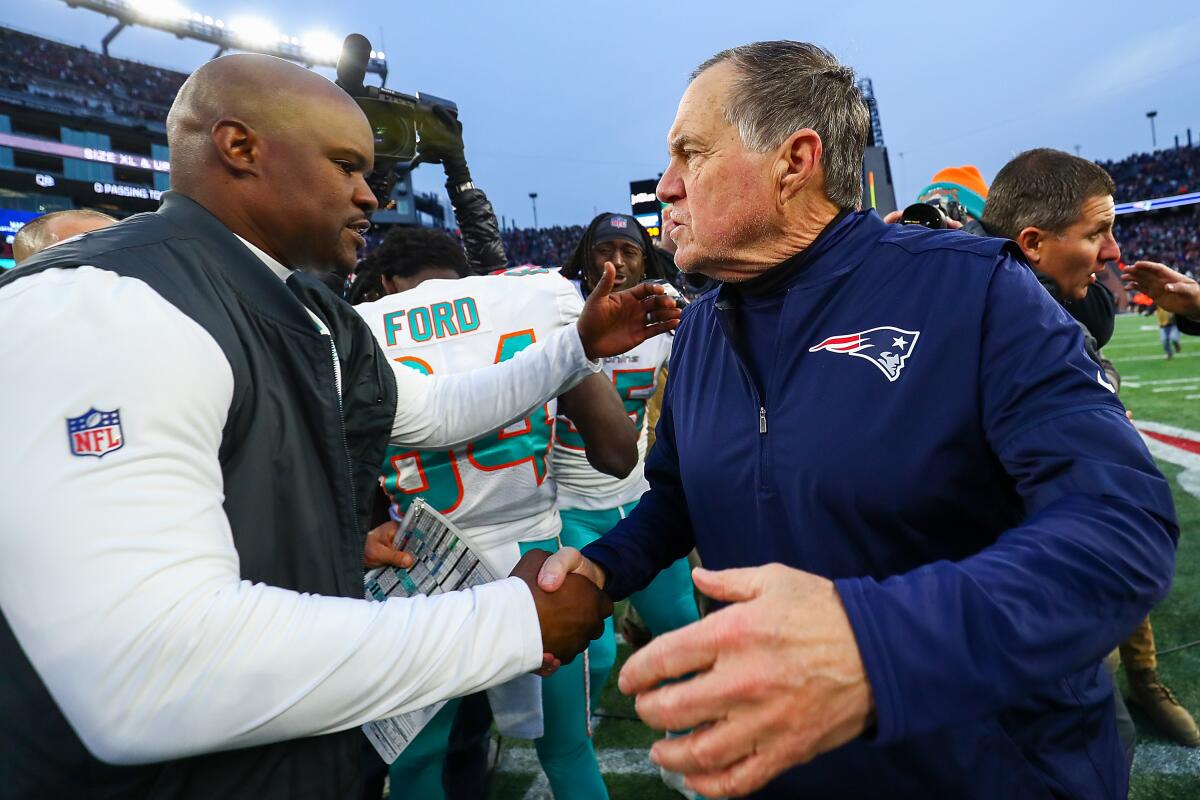
Many have heard the excuses used to justify discriminatory behavior, and they never hide the truth, just like the many excuses the NFL has trotted out for its abysmal hiring practices cannot conceal reality. Seven of the nine head coaching vacancies were filled by white men, some of whom are clearly not better candidates than Flores. No explanation other than racial prejudice can explain this inequity, especially when you consider the two minority hires came after Flores filed his lawsuit. The owners simply don’t trust a man not like them to lead their most prized possession, even if he has all the credentials to do so. But can Flores’ lawsuit solve this problem? Unfortunately, probably not.
::
Last year was the 125th anniversary of Plessy vs. Ferguson, in which the Supreme Court effectively stated that legislation could not resolve social prejudices. While Plessy’s rule of separate but equal was overturned nearly 60 years ago, what the Supreme Court implied remains as true today as it did then for a large number of our citizenry. Those who share the racial demographic of NFL ownership have an inability to understand, trust and connect with people of color, and worst, they have no desire to do so.
Former USC and Chargers center Max Tuerk was suffering from CTE at the time of his death. His parents are trying to make sense of what happened to him.
Fyodor Dostoevsky, speaking as prosecutor to the jury through the character Ippolit Kirillovich in “The Brothers Karamazov,” offers a perspective I have paraphrased when speaking to juries across this country. During my closing arguments, I always remind the jurors that they “are the champion of our justice system and their verdict will be heard not only in the courthouse, but will re-echo throughout our society,” and the public will hear them and will be encouraged or disheartened by their verdict.
While I doubt that Flores’ lawyers will even get to utter similar words to a jury, I sincerely hope that the ultimate jury — Goodell, on behalf of NFL ownership — will be the champion of justice we need right now and will act to address the lack of Black NFL head coaches in a meaningful way. I can tell you one thing, it sure would make my decision to let Townsend play a lot more comforting and meaningful.
Dennis S. Ellis is a graduate of Howard University School of Law, a partner at Los Angeles-based Ellis George Cipollone and still a football player. He can be reached at dsellis2002@gmail.com.
More to Read
Go beyond the scoreboard
Get the latest on L.A.'s teams in the daily Sports Report newsletter.
You may occasionally receive promotional content from the Los Angeles Times.
